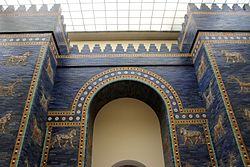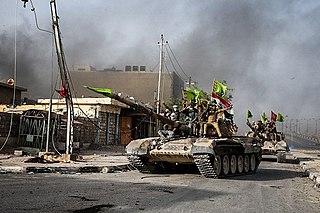
The War in Iraq was an armed conflict between Iraq and its allies and the Islamic State of Iraq and the Levant which began in December 2013 and ended in December 2017. In 2013, the insurgency escalated into a full-scale war with the conquest of Ramadi, Fallujah, Mosul, Tikrit and other towns in the major areas of northern Iraq by the Islamic State of Iraq and the Levant. At its height, ISIL held 56,000 square kilometers of Iraqi territory, containing 4.5 million citizens. This resulted in the forced resignation of Iraqi Prime Minister Nouri al-Maliki, as well as a massive airstrike campaign by the United States and at least a dozen other countries, participation of American and Canadian troops in ground combat operations, a $3.5 billion U.S.-led program to rearm the Iraqi Security Forces, a U.S.-led training program that provided training to nearly 200,000 Iraqi soldiers and police, the participation of Iranian troops including armored and air elements, and military and logistical aid provided to Iraq by Russia.

The departure of US troops from Iraq in 2011 ended the period of occupation that had begun with the U.S.-led invasion in March 2003. The time since U.S. withdrawal has been marked by a renewed Iraqi insurgency and by a spillover of the Syrian civil war into Iraq. By 2013, the insurgency escalated into a renewed war, the central government of Iraq being opposed by ISIL and various factions, primarily radical Sunni forces during the early phase of the conflict. The war ended in 2017 with an Iraqi government and allied victory, however ISIL continues a low-intensity insurgency in remote parts of the country.

Following the advance of the Islamic State of Iraq and the Levant (ISIL) into northern Iraq in mid-2014, Iran began to provide military aid to counter the militant advance. Iran provided technical advisers to the Iraqi government and weapons to the Kurdish peshmerga. Several sources, among them Reuters, believe that since mid-June 2014, Iranian combat troops are in Iraq, which Iran denies. Two US sources contend that in June or July 2014 Iran started an air war against ISIL.

Liberation of Jurf Al Sakhar, codenamed Operation Ashura, was a two-day military operation by Iraqi government forces and Iranian-backed PMU forces beginning on 24 October 2014, aimed at retaking the strategic city of Jurf Al Sakhar near Baghdad from ISIL. The operation was mainly aimed at preventing ISIS militants from reaching the holy cities of Karbala and Najaf, where ISIS threatened to carry out attacks against the millions of Shia visitors commemorating the Day of Ashura.

The Battle of Baiji was a battle that took place in Baiji, Iraq, lasting from late October 2014 to late October 2015. In mid-November 2014, Iraqi forces retook the city of Baiji, and re-entered the Baiji Oil Refinery. However, fighting continued in the region, and on 21 December 2014, ISIL forces took Baiji and put the Baiji oil refinery under siege once again, before Iraqi forces recaptured the city on October 22. It gave Iraqi forces complete control of the highway stretching from Baghdad to Baiji, and allowed Iraqi forces to use Baiji as a base for launching a future assault on Mosul.

The Second Battle of Tikrit was a battle in which Iraqi Security Forces recaptured the city of Tikrit from the Islamic State of Iraq and the Levant (ISIL). Iraqi forces consisted of the Iraqi Army and the Popular Mobilization Forces, receiving assistance from Iran's Quds Force officers on the ground, and air support from the American, British, and French air forces.

The Popular Mobilization Forces (PMF), also known as the People's Mobilization Committee (PMC) and the Popular Mobilization Units (PMU), is an Iraqi state-sponsored umbrella organization composed of approximately 40 forces that are mostly Shia Muslim groups, but also include Sunni Muslim, Christian, and Yazidi groups. The Popular Mobilization Units as a group was formed in 2014 and have fought in nearly every major battle against ISIL. It has been called the new Iraqi Republican Guard after it was fully reorganized in early 2018 by its then–Commander in Chief Haider al-Abadi, Prime Minister of Iraq from 2014 to 2018, who issued "regulations to adapt the situation of the Popular Mobilization fighters". Some of its component militias are considered terrorist groups by some states, while others have been accused of sectarian violence.
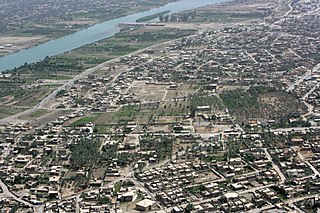
The Battle of Ramadi was a battle launched by the forces of Iraq to successfully recapture the city of Ramadi from the Islamic State of Iraq and the Levant (ISIL), which had taken the city earlier in 2015 in a previous battle. Air power was a major component of the battle, with the United States and other nations conducting over 850 airstrikes in the Ramadi area from July 2015 to late February 2016, and the US crediting airstrikes with 80% of the reason why the city was recaptured. By February 2016, Iraqi forces successfully recaptured the city after two and a half months of fighting. It was predicted that it would take several months to clear the city of the bombs ISIL left behind, with at least 9 months needed to clear the city's Tamim District. At the time, Ramadi had suffered more damage than any other city or town in Iraq.

The Shirqat offensive, codenamed Operation Conquest or Operation Fatah, was an offensive against the positions of the Islamic State of Iraq and the Levant (ISIL) in and around the district of Al-Shirqat District to reach the city of Mosul.

The Anbar campaign (2015–2016) was a military campaign launched by the Iraqi Armed Forces and their allies aimed at recapturing areas of the Anbar Governorate held by the Islamic State of Iraq and the Levant (ISIL), including the city of Ramadi, which ISIL seized earlier in 2015. The United States and other nations aided Iraq with airstrikes.

Qayyarah or Qayara is an Iraqi town located in southern Nineveh Governorate on the west bank of the Tigris river, and about 60 km south of Mosul. It is located in the Mosul District, and it is the seat of Qayyarah subdistrict. It has a population of 15,000. The town is located near the Qayyarah oil field and has an oil refinery on its south-western outskirts. The Qayyarah Airfield West is 20 kilometers west of the town.
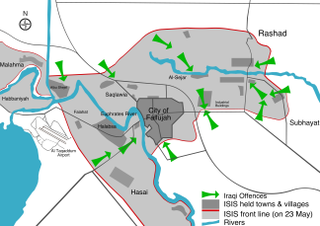
The Third Battle of Fallujah, code-named Operation Breaking Terrorism by the Iraqi government, was a military operation against ISIL launched to capture the city of Fallujah and its suburbs, located about 69 kilometres (43 mi) west of the Iraqi capital Baghdad. The operation began on 22 May 2016, three months after the Iraqi forces had started the total siege of Fallujah. On 26 June, Iraqi forces recaptured the city of Fallujah, before recapturing the remaining pocket of ISIL resistance in Fallujah's western outskirts two days later.

The Battle of Mosul was a major military campaign launched by the Iraqi Government forces with allied militias, the Kurdistan Regional Government, and international forces to retake the city of Mosul from the Islamic State (ISIL), which had seized the city in June 2014. The battle was the world's single largest military operation in nearly 15 years, the largest since the 2003 invasion of Iraq and was considered the toughest urban warfare since World War II.
During the course of the Battle of Mosul (2016–17), an international coalition, primarily composed of the Iraqi Army, Kurdish Peshmerga, CJTF–OIR, along with the allied Popular Mobilization Forces, Company A, 2-502 Infantry Regiment, 101st Airborne Division, captured Mosul from the Islamic State of Iraq and the Levant, which had used Mosul as the capital for the Iraqi half of its "caliphate".
The Battle of Tal Afar was an offensive announced on 20 August 2017 by Iraqi Prime Minister Haider al-Abadi in order to liberate the Tal Afar region from the Islamic State of Iraq and the Levant (ISIL). Victory in the battle was declared by the Prime Minister al-Abadi following the capture of the last ISIL-held area in Tal Afar district.

The 2017 Western Iraq campaign was the final major military operation of the War in Iraq, in the western province of Anbar, and on the border with Syria, with the goal of completely expelling ISIL forces from their last strongholds in Iraq.

The Battle of Hawija was an offensive launched in September 2017 by the Iraqi Army, in order to recapture the town of Hawija and the surrounding areas from the Islamic State of Iraq and the Levant (ISIL).
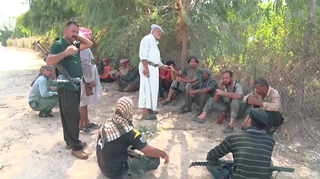
The ISIL insurgency in Iraq is an ongoing low-intensity insurgency that began in late 2017 after the Islamic State of Iraq and the Levant (ISIL) lost territorial control in the War in Iraq of 2013 to 2017. ISIL and allied White Flags fought the Iraqi military and allied paramilitary forces.
The following is a timeline of the Battle of Mosul (2016–17) between February to July 2017.
